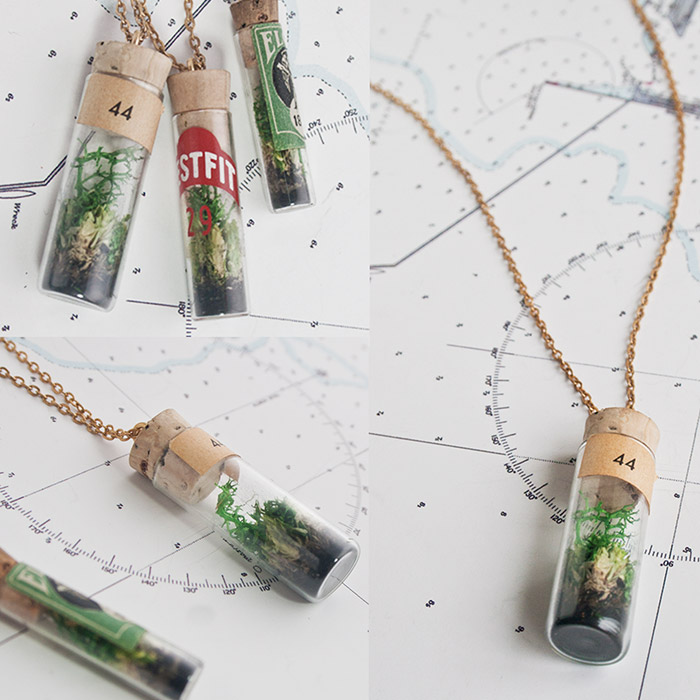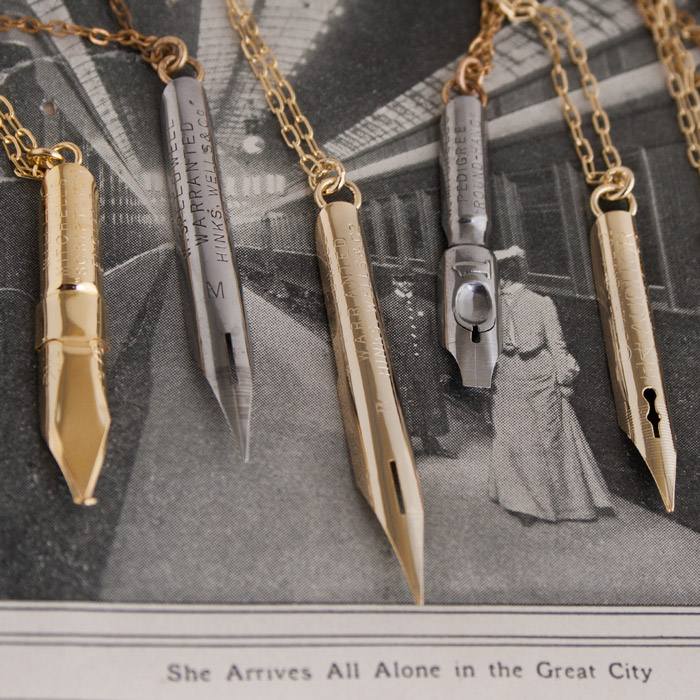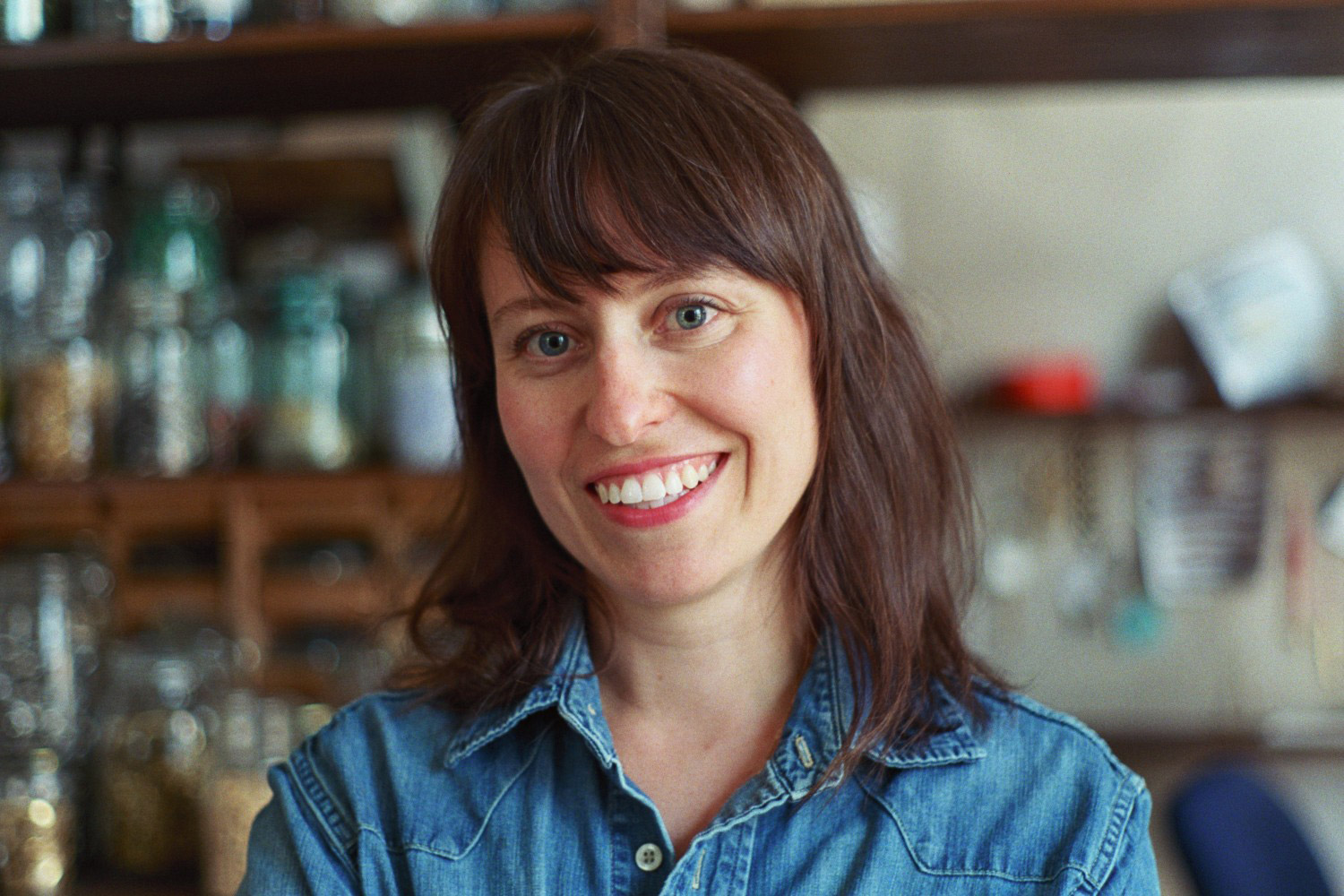
- Interview by Tina Essmaker July 17, 2012
- Photo by John Durgee
Erica Weiner
- entrepreneur
- jewelry designer
Born in Brooklyn and raised in a small New Jersey suburb, Erica earned an art history degree at Vassar College. She then spent a few years touring as a costumer on Broadway shows and a few years as a sample-maker for New York fashion designers. She began making jewelry to relieve stress after work, but after a year, her hobby was her new career. In 2006, she moved operations from her kitchen table to a sunny studio on Chrystie Street.
Interview
Describe your path to becoming an entrepreneur and jewelry designer.
I always knew I wanted to do something creative, but I had a bit of a crisis in high school because my closest friends were great artists. My high school boyfriend was a painter and his talent showed really early and really specifically. My best friend was an illustrator and my sister was creative and is now a painter. Everyone’s talent was manifesting clearly and mine wasn’t. I liked making stuff, but I couldn’t draw. It was like, “That’s it for me. I can’t be an artist.” I came from a small town and there weren’t a lot of artists in other mediums. I didn’t realize you could do other things—things aside from sculpting, painting, and illustrating. I thought I was pretty smart though, so I decided to go to college, but not for art.
I went to Vassar and did a year abroad in Scotland where I was in the textile program at the Glasgow School of Art. I met this dude and fell in love with him and there were all these artists there. I thought maybe art school was for me and I questioned if I should drop out of Vassar and go to art school, but I didn’t. I came back home, finished my thesis, got spit out into New York, and spent the summer after graduation just messing around. The week I decided to buckle down and start figuring out my life was the week that September 11 happened. Then I reasoned that I didn’t have to figure out anything because the world was going to shit.
The following summer I went to be a camp counselor at the summer camp where I used to go. It’s an amazingly forward-thinking arts camp in the woods of Maine. I remembered being happier there than I ever was and after everything with September 11, I needed to feel that—to feel safe and creative. While I was there, I taught kids all kinds of stuff, like photo silkscreen and bead-weaving, by first teaching myself how to do those things.
After that, I got a job as a wardrobe manager on a Broadway tour. I landed the job by stretching the truth on my resume. It was a great job with a one year contract for more money than I ever thought I’d make. They said, “You’ve done wardrobe before, right?” I replied, “Yeah…yup.” I had made costumes for my dance company at Vassar and I liked to sew and make outfits for myself—what can I say, it was the ’90s. I’ll never forget the day I was on stage trying to figure out the difference between stage left and stage right. I turned to my stage partner to ask which way was stage left and he said, “What the fuck? Are you kidding me?” I was freaking out, but I learned. I spent two years working and becoming an expert in wardrobe. I worked my ass off, got some great jobs on Broadway, and met some great people.
Then I decided to change it up and try fashion. I pimped myself out as a sample-maker because when I was still working in theater wardrobe, I started getting hired out because of my reputation for being able to make anything. For example, for the Broadway musical, Oliver, the wardrobe director needed some knitted leather pieces and costumers in New York said, “We don’t knit with leather. We don’t do that specialty stuff. You need a leather person; you need a knit specialist.” I said, “I’ll do it and I’ll do it cheaper than anyone else.” People started passing my name around for the hard, weird stuff and I would figure it out—I was like MacGyver.
When I first got into fashion and the whole Bryant Park experience with the personalities and the models, I was dazzled, but then I quickly decided it was bullshit. I didn’t get to work with particularly interesting or talented designers and I had a very bad experience with one designer, whose name I won’t mention. I didn’t want to be in that world anymore.
I had my second crisis at that point. I didn’t know what the fuck I was going to do. I was broke as a joke and on government assistance. I ended up making some jewelry and selling it at a street fair. I had been making jewelry for a while and it was a lot easier than making clothes. I went, sold a few pieces, made $600, and thought, “This is awesome!” I decided to keep doing that. I’d use the money to buy some food and other things that I needed and then I’d buy more supplies with the rest of the money so that I could make more jewelry. On a different scale, that’s been happening ever since by refining and refining the brand and look and reinvesting what is made back into the business.
Was creativity a part of your childhood?
Yeah. My mom is—I think she would hate to hear me put it this way—but she’s kind of a thwarted artist. She’s a textile artist who loves color and she does a lot of knitting and quilting, but she spent her life as a nurse. Now that she’s retired and not doing nursing, she’s immersed in her art and spends time with a group of women artists. As a kid, I maybe sensed that she wished she wasn’t working at a hospital and that she had wanted to be more creative in her waking hours. Because of that, she encouraged the hell out of us to be artists. If my sister or I had told my mother we were going to be lawyers, she would have been really disappointed. Creativity was heavily encouraged and our house was always full of beautiful, interesting things and creative toys.
Later in his life, my dad became an amazing collector of specific prints from the 1800s and now he’s a specialist in that field. He has a collecting thing and my mom has a producing stuff thing. I think they always had it and I think I picked up on that when I was growing up.
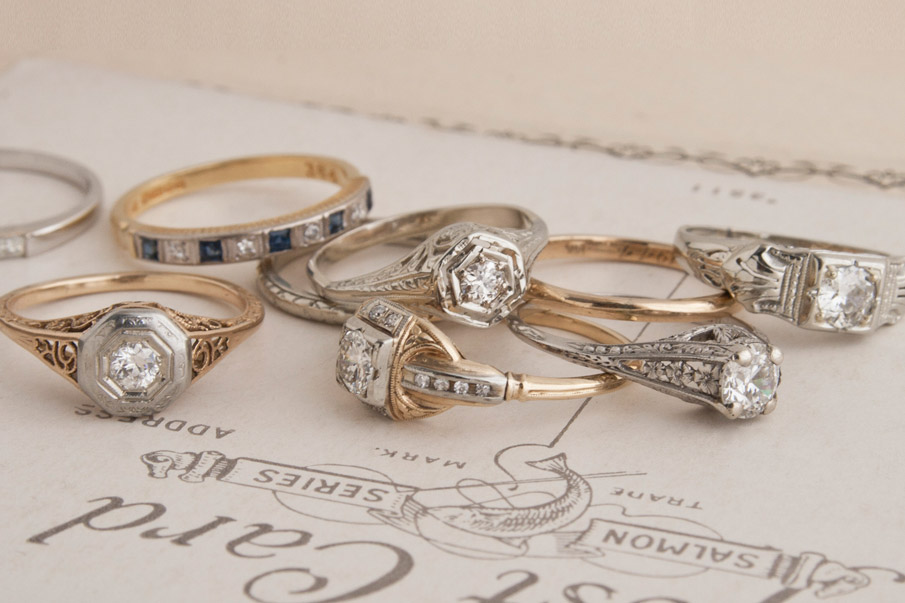
“I was given a great head-start by having supportive parents and being able to go to an amazing school, but I had to struggle through some shitty jobs and find out what I was made of.”
You have a little of each parent in you—you collect and produce things.
Yes. Don’t we all (laughing).
Did you have an “aha” moment when you knew that this was what you wanted to do?
Well, I watch the bank balances really closely and it’s so thrilling. I love that money is being made and as long as that keeps up, I’m going to keep doing this. That’s not to say that making jewelry is the last stop for me. Sometimes I say, “It could have been anything.” Marketing and selling is thrilling to me because I don’t have a ton of mentors or outside help—I just zone into my intuition and try stuff. I don’t know if it’s my Jewish superstition, but sometimes I tell myself, “Don’t get too excited. You’re not out of the woods yet.”
An “aha” moment? My instinct is to say that it’s still just such a work in progress. I don’t know if I have an answer to that question. If anything, it was the day I made $600 at that street fair. I had made money as a gun-for-hire creating specific things for people in the theater world, but that was the first time I made something that was totally from my own brain and hands. I told myself, “I did it—now I’m going to keep doing it!”
On a side note, where did you grow up?
In suburban New Jersey in a city called Mountainside. I wasn’t a very comfortable suburban kid—I was into the alternative, grunge scene and full of angst. It wasn’t pretty. I went to a big football school full of middle class white kids. I could see Manhattan from my bedroom window because my city was on a hill. I would look at the skyline and say, “One day, I’m going to be out of here.” Looking back, I do have good memories of that town, but a lot of the drive and fear and my will to be different grew there.
My family was solidly middle class and my parents worked really hard—they both always worked full-time. There was always a lot of fighting and worrying about money in the house. A huge thing for me was to figure out a way to live a life where I didn’t have to worry and fight about money. I always thought it would be through making a lot of money, which is why making money was always a motivator for me.
I’m not good at doing things I don’t want to do. I got fired from a lot of jobs for not showing up on time or not doing the work because I was bored. I realized I wasn’t going to be good at anything that I didn’t really like, but I had to learn that about myself. Once I find something I want to do, I’ll work my ass off!
Did you have any mentors along the way?
My mother has a whirlwind energy that has been a great base for me. It’s become my standard—you don’t watch TV on your day off; if there’s something to be cleaned you clean it; if there’s something to be fixed, you fix it. She’s a great inspiration to me in that way.
I also had a great boss named Jimm Halliday when I worked in the theater. I was his assistant and would help him set up shows. When a show is about to go on the road, you gather together costumes from old touring productions and from the shut-down Broadway production of that show; you also buy some at vintage stores and alter them and some you make. Jimm saw that I could bust my ass during 15 hour days and that I could solve problems creatively. I worked with him for two years and he is also the funniest man—I developed the sense of humor of a middle-aged gay man. I began to love the best parts of theater culture because of him. His budget wasn’t huge and he couldn’t pay me what I was worth, but he motivated me to keep coming back to do that really tough job over and over because I wanted to be around him, to do right by him, and he had a way of making we want to do really good work. He knew how to make me feel like I was invaluable. I loved working for him and we still talk about working together again.
The hardest part of the job I have now—by far—is running a staff of people. I’ve integrated a lot of the things I learned from Jimm into how I interact with my employees. Some of it has worked and some hasn’t. I think it’s important for our team to be like that world I had with him—you can laugh your ass off, which is important, and you don’t have to tell everyone about your life, but there’s nothing to hide. There’s a super casual atmosphere that belies the intense structure and way we run this company.
One of my biggest fears is being like the boss I had when I was in the fashion world. The designer I worked for was a terrible leader and ran her business into the ground. We have a really incredible team here at EWJ and on my worst days, I worry that the brilliant women who work for me will look at my work style and decisions and think I’m a shitty or lazy leader. Because of that, I used to get down in the trenches, do everything, and work twice as hard as everyone else. Then I had to remind myself I wasn’t doing anyone any favors by doing everything. I’ve made mistakes, but it’s been a learning experience.
Was there a point in your life when you decided to take a big risk to move forward?
I feel like there was never a huge risk because I never took out a giant loan. Well, there is this classic Erica Weiner story that I can tell. It wasn’t long after that $600 day and somehow, Anthropologie had gotten wind of what I was doing. This was in 2007, just when big companies were starting to harness the cool points of small designers. The buyer called me to meet and purchase a style of jewelry for the stores. She came to my apartment because I didn’t have a studio and I laid everything out on the kitchen table. We hashed out a design and she requested 15,000 units. She said she would give me a PO and asked if I could have the units ready for delivery in six weeks. I said, “Yup. No problem.” Then I had to go do a Google search to find out what a PO was because I didn’t know.
We set a price per unit that I would get paid and I did the math and a little dance because it was a lot of money. Once I figured out how much all the materials would cost, I freaked because it was a crazy amount. I didn’t think I could get the money together. I realized what I had in store for me and what it meant and I panicked. I went to sleep for a whole day and night. Then I woke up and called my friend Lindsay, who is now my business partner, and asked her to come over right then because I had a job for her. I taught her how to make necklaces and that was the start of it.
To buy the materials, I ended up getting a bunch of American Express cards and a loan on my checking card. I never considered asking my parents for money. They always firmly believed in helping us out as much as they could while we were in school as long as we were working and paying our bills. Once we were out of college and out of the house, we had to find our own American dream. I have so many friends who are age 35 and still not independent of their parents. People are conflicted about it, but a lot of people live off their parents. I think it’s uncool, but it’s probably just because I feel so proud that I did it on my own. I was given a great head-start by having supportive parents and being able to go to an amazing school, but I had to struggle through some shitty jobs and find out what I was made of.
Actually, I have one more mentor I just thought of to share with you. She’s become more and more of an ongoing mentor in recent years. Her name is Shana Tabor and she runs a jewelry company called In God We Trust. First of all, everyone in Brooklyn knows her. She built her brand how I did—by her own sweat—and when she opens a new store, she strips the floor herself. She has a great sense of humor and even though we’re technically competitors, she is so generous with information. She’s genuinely helpful and will tell me any trade secret. I’ve talked to her before making quite a few big decisions.
Are your family and friends supportive of what you do?
No one has ever been anything but supportive. I just got married last year and my husband is a musician. He has his own company and writes music for TV and is part of the comedy and performing world. It’s so awesome to be with someone who is in a creative business, but not in the same exact circle. I get to come home and have his support and he listens to me. He lets me be me and that’s really important. My friends are supportive too and never miss an opening or a party.
Are you satisfied creatively?
Yes. Most of what I do at work isn’t necessarily with my hands, but it feels creative to cultivate this business. It sort of feels like gardening. It’s been a really long time since I’ve felt that desire for a creative outlet. I don’t feel that specific pain of thwarted creativity that I’ve had in the past. I guess that’s a good indicator that I’m creatively satisfied.
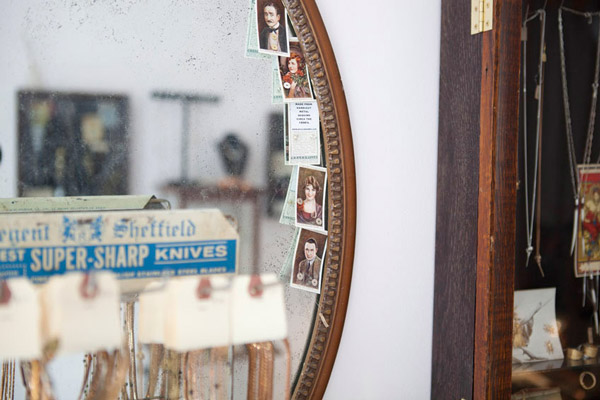
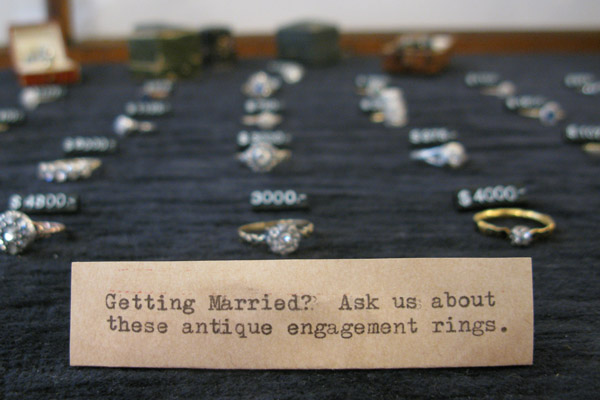
Do you have any thoughts about what you’d like to be doing in the next 5 to 10 years?
Yes. I have a lot I’d like to be doing. I’d really like to start a family and have kids, which I think is creative. I really want to try farming and work with homesteading. I know this is the trend right now and some of my friends think I’m buying into the trend of the urban homestead, but I really want to get animals and raise a family and live a little bit off the grid. I think it would be such a great outlet for my nervous energy, which is often creative energy.
Another thing—and this is advice for creatives. I’ve been diagnosed with an anxiety disorder and am a really a high-strung person. That energy can put you over the edge and turn into depression. Somehow, I’ve learned to put all my energy into the business and use it to work hard for a cause. Finding that focus saved my life in a lot of ways. All of that anxiety is great fuel. Of course, you also have to find something to keep you tethered outside of work. Yoga has been useful for me.
That’s great advice. That was actually the next question—what advice would you give to another creative person starting out? Is there anything else you want to add?
A lot of people want to be designers and they over-think about their product and the look of it. They aren’t ready to put it out there because…fill in the blank. I think you just have to do it, similar to the thinking that if you build it, they will come. Do your thing, get it out there, and then refine—a lot!
The first stuff you make might be dumb; it might suck, but just forget it happened and keep going on. Actually, this is kind of a great story to go with that. I was working a shitty job as a receptionist the year after 9/11 happened and I hated it. In my spare time, my roommate and I started this company where I was making underwear with silkscreens of Christopher Walken’s face on them. We called them Walken Pants. We sold them on eBay and only sold 25 pairs, but I was in entrepreneurial heaven. Eventually, the guy who hired me for my theater job was the guy who thought Walken Pants was the best thing ever—that’s how I got the job!
How does where you live impact your creativity?
Right now I live in Red Hook in Brooklyn with my husband and it’s like a haven here. We have a big, three-story house that was built in 1901 and a great backyard. I mess around with decorating the house and I have a garden and a few animals. I’m happy here.
Your store is in Manhattan. Where is your studio?
It’s in Manhattan a few blocks away from the store. I worked in my apartment for years and it ended up being bad for me. I try to have some separation between my work life and personal life so that when I’m at home, I can relax.
It can be hard to do when there are a lot of things going on at work, which is the case right now. We’re launching a fine jewelry line soon and are also hopefully going to be opening a store in Williamsburg. It’s intense and I find myself already thinking about work when I wake up. Half of my brain is always working and it can really suck, but if it wasn’t doing that, I don’t know what it would be doing.
Is it important to you to be part of a creative community of people?
I don’t know how to answer that. I’m sort of a lone wolf when it comes to my work and I don’t do much collaborating outside of the office, although I do have a lot of friends who are creative and have their own businesses. We talk business a lot, but don’t discuss creative processes as much, probably because most of us spend most of our time thinking about and problem-solving the business issues.
What does a typical day look like for you?
I wake up around 9am, have a cup of coffee, look at the garden, feed my dog and cats, and then my husband gives me a ride to the subway and sends me on my way to the big city. Once or twice a week I go to the store to see how things are going, but most days I go straight to the studio to tackle whatever is going on that day. I think people have a fantasy that I’m working with jewelry all day, but that’s not what it is. I’m making spreadsheets and shit, emailing people, and trying to get problems solved and make decisions. It’s not a lot of creating.
Current album or albums on repeat?
I’m actually really bad at working with music on, but when I’m at home I’ve been listening to a lot of reggae. I’ve been to Jamaica a few times in the last few years and I love it. The only time I have to choose music for myself is when I’m in the store. I’ll usually listen to the same two albums on repeat. One is The Andrews Sisters and the other is Roxy Music.
Favorite TV shows or movies?
I love Deadwood. I’m saving the last episode to watch because I’m going to be really sad when it’s over. I’ve also been watching a show called Dual Survival about surviving in the wilderness and it makes me feel rugged and outdoorsy. I also like How It’s Made.
I like the movie Overboard with Goldie Hawn. It’s a secret language with my sister. We refer to it all the time and no one ever knows what we’re talking about. I also like Wet Hot American Summer, which has a huge cult following. It came out when I was a summer camp counselor and I’ve been a huge fan since.
Do you have a favorite book?
I like to read books about Antarctic exploration in the 1800s and historical fiction. Right now I’m reading The Big Oyster: History on the Half Shell by Mark Kurlansky, which is about the history of New York City through the oyster trade. I love NYC and oysters.
What is your favorite food?
There are so many. I’m very interested in food. Last night I went with friends to a place in Bed-Stuy called Do or Dine. We got these drinks that looked like egg yolks, but were filled with booze. It was weird, but beautiful and we had an awesome time. I can’t pick a favorite—I just love eating.
What kind of legacy do you hope to leave?
I hope I inspire other people to use their knowledge and desires to start their own creative businesses.
I also want to encourage others to make policies not based on the norm, but based on what is fair. I’ve had to figure out the policies for my employees and it’s been really hard. For example, it’s important for my employees to have health insurance. I find it unconscionable that they would have to choose between health insurance or paying the rent. It’s not like I’m under-paying them—that’s just what New York is like. I consulted other employers and was told to make my employees pay for their plan or pay into it, but that’s just not right. I remember the feeling of being uninsured and scared that I would get sick. I made the decision to pay for everyone’s health insurance. We also do things like donate money to charities for arts education in the public schools. I feel like if you have a little money and a little power, you have to try to make shit right.
“…I’ve learned to put all my energy into the business and use it to work hard for a cause. Finding that focus saved my life in a lot of ways. All of that anxiety is great fuel.”
